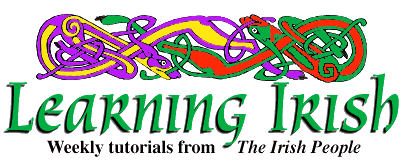
Irish Lesson 48
Pronunciation Review The letter groups "abh" and "amh" without síneadh fada over the "a", in a first syllable and inside a word, are usually pronounced (ou) as in the English word "out". Examples of the pronunciation of these: abha (OU-uh), river babhta (BOU-tuh), bout labhair (LOU-ir), speak gabha (GOU-uh), smith leabhar (LOU-wuhr), book Feabhra (FOU-ruh), February amhras (OU-ruhs), doubt amhrán (ou-RAW*N), song ramhar (ROU-wuhr), fat amharclann (OU-uhr-kluhn), theater samhra (SOU-ruh), summer Samhain (SOU-in), November In a later syllable or at a word end, "amh" or "abh" can be pronounced (v), as in: agallamh (uh-GAHL-uhv), dialog déanamh (DAY*N-uhv), making, doing léamh (LAY*-uhv), reading cliabh (kleev), basket sliabh (shleev), mountain
A síneadh fada over the "a" in "amh" or "abh" usually results in an (aw*v) sound. Examples: lámh (law*v), hand; ábhar (AW*-wuhr), material, subject; sámh (saw*v), pleasant.
Grammar Here are some more uses for the preposition "do" (duh), meaning "to" or "for". The common salutation "Dia duit", which becomes "Dia daoibh" (DEE-uh geev) when you address two or more persons, is an example. It is a shortened form of: "Go mbeannaí (goh MAN-ee) Dia duit"; may God bless you. Tabhair dom é (TOO-ir duhm ay*), give it to me; tugaim an t-airgead dó (TUG-im un TAR-i-guhd doh), I give him the money, are examples of "do" with "give". The pronouns "é, í, iad" go to the end of the sentence. Lig dom é a dhéanamh, let me do it; lig sé don fhear an leabhar a léamh, he let the man read the book. Taispeáin dom é (tash-PAW*-in duhm ay*), show it to me. Tá grá aige di (taw* graw* eg-GE dee), he loves her. Is fíor duit (is FEE-uhr git), true for you, you are right. Is duitse é seo, this is for you.
Vocabulary Masculine nouns garáiste (guh-RAW*SH-te), garage glas (glahs), lock grá (graw*), love
Feminine nouns duilleog, an duilleog (dil-YOHG, un dil-YOHG), leaf craobh, an chraobh (kray*v, un K*RAY*V), branch
tarraing, ag tarraingt (TAHR-ing, uh TAHR-inkt), pull tarraingím (TAHR-ing-eem), I pull céanna (KAY*-uh-nuh), same
sroich, ag sroicheadh (sri, uh SRI-huh), reach a destination sroich sé an chathair (sri shay* un K*AH-hir), he reached the city
Drill Go through a progressive drill with "do", starting with: An ligeann sé dom é a cheannach? Ní ligeann sé dom é a cheannach. Ligeann sé duit é a cheannach. An ligeann sé duit é a cheannach? Etc.
Reading Exercise The narrative from Lesson 47 is continued. D'éirigh an ghrian níos airde sa spéir, agus bhí Brian ábalta an tsráid agus na tithe le taobh na sráide a fheiscint. Ní raibh mórán duilleog ar na crainn, agus shéid an ghaoth trí na craobhacha loma. Bhí an geimhreadh ag teacht. Bheannaigh Brian do Shéan, cara leis. Bhí Seán ina chónaí i dteach níos faide thuas an tsráid, timpeall leathmhíle ó Bhrian. "Cá bhfuil do charr, a Bhrian",. arsa Seán leis. "Ó, tá obair le déanamh air. Tá sé i mo gharáiste fós. Níl an t-am agam chun na deisithe a dhéanamh," arsa Brian.
Key: DEYE-ree un YREE-uhn nees AR-de suh spay*r, AH-guhs vee BREE-uhn AW*-buhl-tuh un traw*d AH-guhs nuh TEE-huh le tay*v nuh SRAW*D-e uh ESH-kint. nee rev moh-RAW*N dil-YOHG er nuh krin, AH-guhs hay*d un gway* tree nuh KRAY*V-uh-huh LOHM-uh. vee un GEV-ruh uh TYAHK*T. VAN-ee BREE-uhn duh hyaw*n, KAH-ruh lesh. vee shaw*n nuh K*OHN-ee i DAHK* nees FAH-de HOO-uhs un traw*d, TIM-puhl la-VEEL-e oh VREE-uhn. "kaw* vwil duh k*ahr, uh VREE-uhn", ER-suh shaw*n lesh. "oh, taw* OH-bir le DAY*N-uhv er. taw* shay* i muh guh-RAW*SH-te fohs. neel un toum uh-GUHM hun nuh DESH-i-he uh YAY*N-uhv", ER-suh BREE-uhn.
Translation: The sun rose higher in the sky, and Brian was able to see the street and the houses along the street. There weren't many leaves on the trees, and the wind blew through the bare branches. Winter was coming. Brian greeted Seán, his friend. Seán lived in a house farther up the street, about a half mile from Brian. "Where is your car, Brian", said Seán to him. "Oh, there's work to be done on it. It's in my garage still. I don't have time to make the repairs," said Brian.
Notes: "High" is "ard", but "higher" is "níos airde". Often in going to the comparative, the last consonant in an adjective becomes slender, as in "fada", which becomes "níos faide", longer, farther. One way to say "to be able" is: "Tá sé ábálta." Another way is: "Is féidir leis" (is FAY*-dir lesh), he can. The verbal noun follows both: Tá sé ábálta an obair a dhéanamh. "Beannaím dó" means "I greet him". When you dwell or reside in a place, "Bíonn tú i do chónaí ann," (BEE-uhn too i duh K*OHN-ee oun), You be in your living there. We are living here" is "Bímid inár gcónaí anseo" (BEE-mid in aw*r GOHN-ee un-SHUH), we be in our living here. (c) 1998 The Irish People. May be reprinted with credit. |